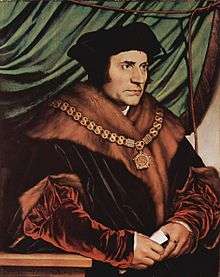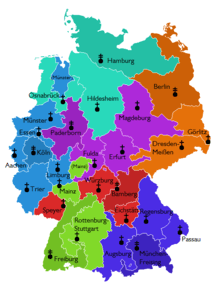Katholische Junge Gemeinde
| Abbreviation | KjG |
|---|---|
| Formation | June 17, 1970 |
| Type | German non-profit youth organization |
| Purpose | association of young Catholics and Catholic local groups |
| Headquarters |
Düsseldorf, |
Membership | 80.000 members in 24 diocesan organizations |
Presidents |
Anne Schirmer Marc Eickelkamp |
Praeses | Eva-Maria Düring |
Secretary-General | Peter Dübbert |
| Website | www.kjg.de |
The "Katholische junge Gemeinde" (short: "KjG") is one of the big German Catholic youth organizations. KjG has a democratic structure and local groups in all over Germany (mainly in Catholic parishes) with in total about 80.000 members. The KjG is a member of the Catholic umbrella of youth organizations Fimcap and the German umbrella of Catholic youth organizations BDKJ.
History
See also: Overview of the history of KjG on the homepage of KjG (on German)[1]
- 1896: The "Katholische Jungmännerverband" (translation: Catholic organization of young men) is founded. It is the predecessor organization of the "Katholische Jungmännergemeinschaft" (KJG, translation: Catholic society of young men).
- 1915: The national organization of "Katholische Jungfrauenvereine Deutschlands" (translation: Catholic organizations of young women in Germany), the predecessor organization of "Katholische Frauenjugendgemeinschaft" (KFG, translation: Catholic society of young women), is founded.
- 1938: Catholic youth organizations were forbidden in Germany by the NS regime.
- 1947: The "Katholische Jungmännergemeinschaft" (KJG, translation: Catholic society of young men) is founded.
- 1954: The "Katholische Frauenjugendgemeinschaft" (KFG, translation: Catholic society of young women) is founded.
- 1970: The "Katholische Jungmännergemeinschaft" and the "Katholische Frauenjugendgemeinschaft" merge to the "Katholische junge Gemeinde" (KjG, translation: Catholic young society).
- 1979: The federal assembly of KjG decides that KjG shall advocate for a nuclear power phase-out.
- 1995: KjG adopts the "Altenberg Declaration" (German: "Alternberger Erkärung"). In the declaration KjG emphasizes the importance of spiritual assistants being part of the leadership in KjG and that they need to be elected democratically by the members of KjG.[2]
- 2001/2002: KjG calls in their campaign "enjoy the difference" for more tolerance. Especially, the campaign emphasizes that no human being shall be discriminated due to their origin, appearance, race, possession, or other superficial criteria and takes a strong stand against xenophobia.[3]
- 2005: KjG organized with Fimcap the a centre for international exchange during the 20th World Youth Day in Cologne named "feel the spirit" and visited by more than 20,000 pilgrims.
- 2010: KjG hosted the General Assembly of Fimcap in Munich.
- 2012: The diocesan branch of KjG in the archdiocese of Munich and Freising hosted the Fimcap EuroCourse 2012.
- 2013: More than 100 groups of KjG took part with projects in the 72 hours campaign, the biggest social campaign of young people in Germany.
- 2014: In the year of the European elections 2014 KjG organized the nationwide project "YOUrope - Strippenzieher*innen für eine jugendgerechte EU". The aim of the project was to encourage young people to think about youth rights and to show them possible ways to participate in political processes.[1]
KjG and contemporary worship music
KjG had a significant influence on the development of contemporary worship music (German: Neues Geistliches Lied, NGL) in Germany.[4]
Patron and Motto
The patron of KjG is Thomas More (1477–1535). The motto of KjG is "I never thought of consenting to a matter, if it would defy my morals." This quote is attributed to Thomas More.[5]
Emblem
The emblem of KjG is called "Seelenbohrer". Literally translated from German this means "soul thriller". It was designed in 1967 by Alfred Klever, a designer based in the vicinity of Cologne, in the course of a course on screen printing in Altenberg. It should represent the motto of the joint Pentecostal meeting of KJG and KFG, the predecessor organizations of KjG, in Münster in 1968: "Zur Antwort bereit!" (German for: "Prepared for the answer!").[6] On this national meeting the meaning of the emblem was explained as follows: "The dot in the center represents Christ, the Good News and the life. The bar moving around the dot symbolizes the humans who, inspired by the center, try to tackle problems and find and give answers. The arrow represents dynamic. Acting based on the solid ground of the Gospel means at the same time to move on and to pursue goals." Another (self-)ironic interpretation of the emblem is that it represents "beating around the bush, closely missing the goal and than move away quickly".[7]

Structure
Local level
The 80,000 members are organized in various local groups spread all over Germany. Most local groups are based at a parish. However, local groups can be also located at over places like e.g. schools. Each local group usually has a team of voluntary group leaders which prepare activities like e.g. weekly meetings or camps for children, adolescents and/or young adults. Furthermore, each local group has a board of two or more chairpeople (usually as many female as male chairpeople) coordinating the local group. The chairpeople are elected by the regular assembly of all members of the local group. Usually, all members regardless of their age are eligible to vote (some local groups however require a minimum age of 13 and a maximum age of 27).[8]
Diocesan organizations

| Diocesan organizations of KjG | |
|---|---|
| KjG Aachen[9] | |
| KjG Augsburg[10] | |
| KjG Bamberg[11] | |
| KjG Berlin[12] | |
| KjG Eichstätt[13] | |
| KjG Essen[14] | |
| KjG Freiburg[15] | |
| KjG Fulda[16] | |
| KjG Hamburg[17] | |
| KjG Hildesheim[18] | |
| KjG Köln[19] | |
| KjG Limburg[20] | |
| KjG Magdeburg[21] | |
| KjG Mainz[22] | |
| KjG München & Freising[23] | |
| KjG Münster[24] | |
| KjG Osnabrück[25] | |
| KjG Passau[26] | |
| KjG Paderborn[27] | |
| KjG Regensburg[28] | |
| KjG Rottenburg-Stuttgart[29] | |
| KjG Speyer[30] | |
| KjG Trier[31] | |
| KjG Würzburg[32] |
References
- 1 2 Homepage der KjG: YOUrope
- ↑ "Geschichte der KjG". www.kjg.org. Retrieved 2016-09-13.
- ↑ "enjoy the difference - Home". www.enjoy-the-difference.de. Retrieved 2016-09-13.
- ↑ Frank, René (2003-01-01). Das neue geistliche Lied: neue Impulse für die Kirchenmusik (in German). Tectum Verlag DE. ISBN 9783828885738.
- ↑ Homepage of KjG
- ↑ Berichte von der Bundeskonferenz der KjG 2011: Freitag, 17.6.
- ↑ KjG.de: Der Seelenbohrer
- ↑ "Strukturen der KjG". kjg.de. Retrieved 2016-09-13.
- ↑ Homepage of KjG Aachen
- ↑ Homepage of KjG Augsburg
- ↑ Homepage of KjG Bamberg
- ↑ Homepage of KjG Berlin
- ↑ Homepage of KjG Eichstätt
- ↑ Homepage of KjG Essen
- ↑ Homepage of KjG Freiburg
- ↑ Homepage of KjG Fulda
- ↑ Homepage of KjG Hamburg
- ↑ Homepage of KjG Hildesheim
- ↑ Homepage of KjG Köln
- ↑ Homepage of KjG Limburg
- ↑ Homepage of KjG Magdeburg
- ↑ Homepage of KjG Mainz
- ↑ Homepage of KjG München & Freising
- ↑ Homepage of KjG Münster
- ↑ Homepage of KjG Osnabrück
- ↑ Homepage of KjG Passau
- ↑ Homepage of KjG Paderborn
- ↑ Homepage of KjG Regensburg
- ↑ Homepage of KjG Rottenburg-Stuttgart
- ↑ Homepage of KjG Speyer
- ↑ Homepage of KjG Trier
- ↑ Homepage of KjG Würzburg